If you’re on the market to switch your home’s energy sources to solar, you’re most likely overwhelmed with the vast amounts of information available on solar energy.
That information isn’t always easy to understand, and sometimes people just want to know the best options available so they can make the right choice for their home.
We’re here to help you choose a solar inverter that will meet your needs, whether you’re installing a full array, a single panel, or expanding a solar panel kit.
In fact, our team tested 5 of the best solar grid tie inverters, and below, we review our findings.
Our Top Picks
| Product | Details | ||
|---|---|---|---|
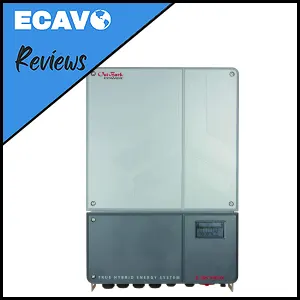 |
Best Overall: Outback Power Skybox Grid-Tie Hybrid Inverter | This Grid-Tie Hybrid Inverter stands out because of its ease of use, quality manufacturing, and ability to serve as a backup energy source. | Check Price |
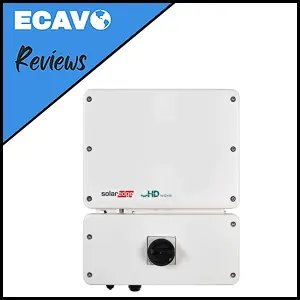 |
Best Residential: SolarEdge HD-Wave Grid-Tied Inverter | With a low price and great features, the SolarEdge inverter is a no-brainer for mid-sized residential solar arrays. | Check Price |
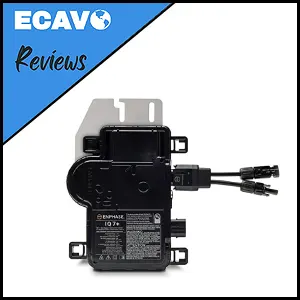 |
Best Microinverter: Enphase IQ7+ | This small microinverter works with a single solar panel and carefully tracks and records data. It pairs with various Enphase products. | Check Price |
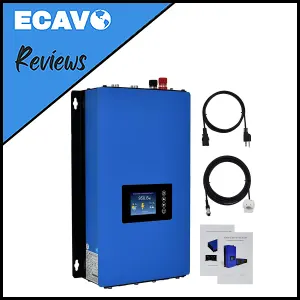 |
Best For Small Homes: Eco-Worthy Auto Switch MPPT Solar Grid-Tie Inverter | Handles just enough watts to serve a small home with a few solar panels, with the option to expand. | Check Price |
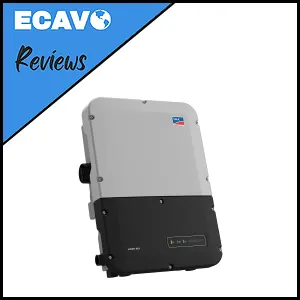 |
Best For Large Homes: SMA Sunny Boy 7.7-US Inverter | High efficiency and high wattage output, this solar grid tie inverter is for solar service for a larger home. | Check Price |
How We Chose the Best Solar Grid Tie Inverters
To find the best solar grid-tie inverters, we began our search by identifying the top leading manufacturers of the best solar inverters.
We narrowed our search even further by finding out which manufacturers carry the best hybrid solar inverters.
Here at Ecavo, we are most concerned with caring for our planet and remaining as green and eco-friendly as possible.
Therefore, the first thing we looked for in the solar inverters we tested is if they’re eco-friendly.
For this specific hybrid solar grid-tie inverters test, we paid attention to the price and the following criteria as we ranked.
Wattage Output
The wattage is a key piece of information that you need to look out for when shopping for your solar grid tie inverter.
To prevent the loss of energy, make sure that the watts of the inverter equal the watts of the solar panels.
We recommend getting a high-wattage inverter with a series of high-wattage panels to maximize your energy production.
Peak Efficiency
The peak efficiency will determine the maximum efficiency the grid tie inverter can achieve when working in ideal environments.
For a grid tie system to meet its rated power, it must have an input that exceeds its output if its efficiency rating is below 100%.
Most solar grid tie inverters are in the range of 90-96% efficiency. Overall, the higher the percentage, the better the inverter.
Inverter Types
Several types of grid tie inverters vary in price and function and offer flexibility to those with renewable energy functions.
Here’s a breakdown of the different types of solar inverters.
Off-Grid Inverters
An off-grid inverter operates independently of the local public utility system, unlike on-grid solar inverters.
They have a unique capability of converting sunlight into DC electricity and storing it in a set of batteries.
When the inverter is being used, it uses DC electricity to produce AC electricity, providing energy to the entire home.
Micro Inverters
A micro inverter is the smallest grid tied system on the market, both in size and function. This is because they can support just one solar panel at a time.
This is perfect for those living in a tiny home, like a trailer.
Hybrid Inverters
Hybrid inverters are unique because they allow for both on-grid and off-grid use.
They can be hooked up to the local public utility system and used independently because of the unique energy storage capabilities of the batteries.
They can store energy for future use, so you can still be comfortable in your home when you’re off-grid.
String Inverters
If you’re looking for the least expensive option, string inverters would be your best bet. Staying true to its name, a string inverter supports several solar panels stringed together.
While they’re great in the right conditions, a single panel can shut down your whole system if it fails or is shaded.
They should only be used in full, direct sunlight that is unobstructed to prevent unintentional failure.
To learn more about how a solar inverter works, check out this article from the Office of Energy Efficiency & Renewable Energy. In rating the best inverter, we gravitated more towards hybrid-type inverters.
They have the best efficiency and tend to be eco-friendly with their capability of capturing solar power and saving it for later use.
This allows you to maximize your energy production and charge batteries while remaining on-grid.
We researched and tested 5 of the best solar grid tie inverters we found and here are our findings.
Best Solar Panels Reviewed
1. Best Overall: Outback Power Skybox Grid-Tie Hybrid Inverter
Product Ratings
| Affordability | 4/5 |
| Eco-friendly | 5/5 |
| Watts | 5/5 |
| Efficiency | 5/5 |
| Inverter Type | 5/5 |
Eco-friendly: Yes | Watts: 5000W | Brand: Outback Power | Efficiency: 97% | Price: $$$$
What We Liked
- High efficiency of 97%
- Easy to use
- Quality manufacturing
- Can store power for future use
- Has a remote control
- Hybrid inverter
- Compliant with California and Hawaii solar grid requirements
What We Didn’t Like
- Price is a bit high
Watts & Efficiency
The combination of a high wattage (5000W) and 97% efficiency, this hybrid inverter is sure to source enough energy to keep the power on.
We really liked this solar grid tie inverter because it can store power for future personal or emergency use.
This is efficient and ensures that future needs are met in the event of bad weather.
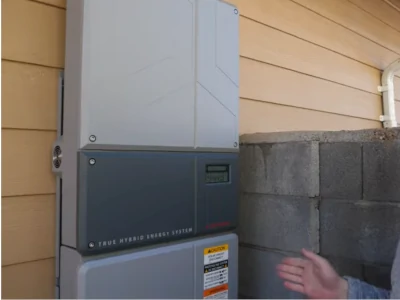
Although this energy system comes with a fairly high price tag, we believe that it will contribute to lower energy costs and your overall household budget in the long run.
According to the manufacturer, “energy management is based on time-of-use and demand charge rate structures to reduce energy costs.”
If you live in a place like California where blackouts occur, or utility prices fluctuate depending on the time of use, this grid tied inverter will suit you the best.
It has an option to also be hooked up to a backup solar generator to be prepared for an unexpected blackout.
Inverter Type
One of the key selling points for the Skybox is its hybrid configuration.
While most grid tied inverters only continuously feed a power supply to a household or public grid, the Skybox can store backup power for later use.
It works with any regular 48V battery bank and has an input for a backup generator.
The grid tie inverter is easy to install because the inverter, remote control, load center, and PV inputs are packaged in a single primary console.
This eliminates the need for complicated wiring, connection between boxes, or mounting multiple units.
See Price on Amazon2. Best Residential: SolarEdge HD-Wave Grid-Tied Inverter
Product Ratings
| Affordability | 5/5 |
| Eco-friendly | 5/5 |
| Watts | 5/5 |
| Efficiency | 5/5 |
| Inverter Type | 3/5 |
Eco-friendly: Yes | Watts: 5,000W | Brand: SolarEdge | Efficiency: 99% | Price: $$$
What We Liked
- Small, lightweight and easy to install
- High wattage output
- High efficiency
- Incredibly reliable
What We Didn’t Like
- Doesn’t include remote control
Watts & Efficiency
The best feature of the SolarEdge HD-Wave inverter is its record-breaking efficiency rating. Most traditional grid tied systems operate with a 90-97% peak efficiency.
These SolarEdge inverters maximize energy production with an incredible 99.2% efficiency.
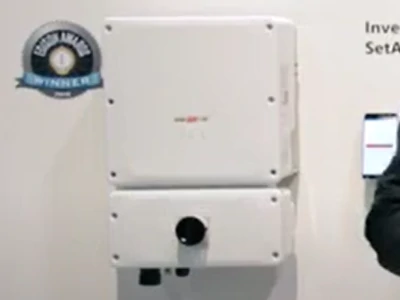
Inverter Type
This inverter is operated on a string inverter that connects several solar panels together.
Because of the string inverter, the cost of the SolarEdge HD-Wave Grid-Tied Inverter is lower than some of the other grid tied systems we reviewed.
Although the cost is a bit more affordable, it is important to note that the panels connected to this grid tie inverter must only be used in full, direct sunlight to prevent a system shutdown.
However, if you live in a generally sunny climate like California, this shouldn’t be a challenge for you.
See Price on Amazon3. Best Microinverter: Enphase IQ7+
Product Ratings
| Affordability | 5/5 |
| Eco-friendly | 5/5 |
| Watts | 3/5 |
| Efficiency | 5/5 |
| Inverter Type | 4/5 |
Eco-friendly: Yes | Watts: 290W | Brand: Enphase | Efficiency: 97.6% | Prices: $$
What We Liked
- High efficiency
- Allows for future expansion
- Records and tracks data
What We Didn’t Like
- Accommodates only 1 solar panel at a time
Watts & Efficiency
When we initially checked this solar power system out, we immediately noticed the relatively low wattage of 289W, which was explained by the microinverter.
Because it supports only one solar panel at a time, we found that most housing structures may need multiple panels to fully power their home through solar.
The upside of this setup is that each panel has its own inverter and won’t be affected if another panel has gone out.
If you decide to later expand your solar system, you will have that option by purchasing more panels and grid tied solar inverters.
Check out this article to learn more about the benefits of microinverters.
See Price on Amazon4. Best For Small Homes: Eco-worthy Auto Switch MPPT Solar Grid-Tie Inverter
Product Ratings
| Affordability | 5/5 |
| Eco-friendly | 5/5 |
| Watts | 5/5 |
| Efficiency | 4/5 |
| Inverter Type | 5/5 |
Eco-friendly: Yes | Watts: 1000W | Brand: ECO-WORTHY | Efficiency: 90% | Price: $$
What We Liked
- Perfect for small homes
- Can expand to a bigger size in the future
- Low cost
- Easy installation
What We Didn’t Like
- The inverter cannot connect with a battery back
Watts & Efficiency
As a budget-friendly option, the Eco-worthy Auto Switch Inverter is a steal. It offers buyers the opportunity to expand their solar arrays in the future by stacking inverters.
As a standalone, the inverter can only handle 1,000W, just enough for small homeowners with a few solar panels.
The model comes with a standard range of features and options. During our inverter test, we found out that it will support only 24V DC input.
When we attempted to use something with a lower input, the unit didn’t charge.
We immediately understood that while it can’t accommodate many homes, it does provide a great option for those who have smaller homes and wish to expand in the future.
Inverter
This solar power system is a string inverter that connects a series of solar panels together to deliver energy.
This type of grid tied system isn’t an option for everyone because it needs to be placed in direct, unobstructed sunlight at all times to prevent accidental failures.
This will work out well for those of us who live in sunny states like California or Arizona.
See Price on Amazon5. Best For Large Homes: SMA Sunny Boy 7.7-US Inverter
Product Ratings
| Affordability | 5/5 |
| Eco-friendly | 5/5 |
| Watts | 5/5 |
| Efficiency | 5/5 |
| Inverter Type | 4.8/5 |
Eco-friendly: Yes | Watts: 7700W | Brand: SMA | Efficiency: 97.5% |Price: $$$
What We Liked
- High wattage and efficiency
- Can be controlled via a smartphone app
- Includes comprehensive data collection and analysis
What We Didn’t Like
- Very large and not as easy to install
Watts & Efficiency
With its high wattage that produces 7700W and high efficiency, the Sunny Boy 7.7-U.S. grid tie inverter is a great option for large residential solar arrays.
This much power can easily service a household and produce an excess to feed back into the grid.
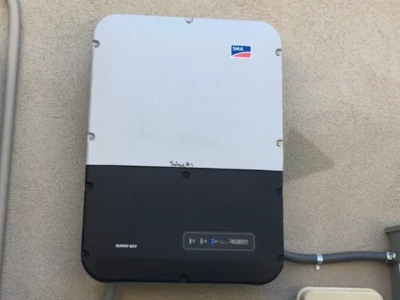
The Sunny Boy 7.7 includes up to 2,000W of secure power supply. Multiple units of independent MPPT inputs can accommodate different panel stringing options.
The advanced technology used in this grid tie inverter is built to keep energy flowing, even in the event of sunlight obstruction.
This will give you a reliable supply of solar energy to meet all your needs.
Inverter Type
The inverter is a string type that requires constant, direct sunlight.
We don’t hesitate to recommend this grid tie inverter because of its SMA OptiTracTM Global Peak technology, which prevents energy loss due to shading.
A huge selling point is that this grid tie inverter is the only one on the market that connects to smartphones.
We enjoyed this feature immensely during our tests as it sped up installation. It also gives great accessibility and control at your fingertips.
See Price on AmazonComparison Chart
| Products | Best Overall | Best Residential | Best Microinverter | Best For Small Homes | Best For Large Homes |
| Overall Rating | 4.8/5 | 4.6/5 | 4.4/5 | 4.8/5 | 4.8/5 |
| Affordability | 5/5 | 5/5 | 5/5 | 5/5 | 5/5 |
| Eco-friendly | 5/5 | 5/5 | 5/5 | 5/5 | 5/5 |
| Watts | 5/5 | 5/5 | 5/5 | 5/5 | 5/5 |
| Efficiency | 5/5 | 5/5 | 5/5 | 4/5 | 5/5 |
| Inverter Type | 5/5 | 3/5 | 4/5 | 5/5 | 4.8/5 |
The Winner
The overall winner for the best solar inverter is the Outback Power Skybox Grid-Tie Hybrid Inverter.
Using cutting-edge technology, Outback delivers an inverter that produces high wattage levels and peak efficiency.
We were impressed with the lasting quality, ease of use and installation this grid tie system required.
With the advanced build of this inverter and high repetition of Outback Power, it isn’t difficult to understand why this inverter would stand out from the rest on the market.
How to Choose the Best Solar Inverter
We know how overwhelming it can be to choose a solar inverter right for your home. Here’s a breakdown of what to look for when shopping for a solar inverter.
Specs
Each solar inverter comes with a data sheet that provides the details of each inverter. Here’s what to pay close attention to:
Output Voltage
For residential use, an output of 240VAC is sufficient. Larger commercial energy storage systems will need 208-600VAC.
Rated Output Power
Depending on the output voltage, each inverter will have a different rating. The rating will be in either watts (W) or kilowatts (kW).
Maximum Input Current
This dictates the maximum amount of current the inverter can handle. The current will be lost if the solar array produces more than the maximum input the inverter can use.
Maximum Output Current
This determines the rating of protection devices, such as breakers and fuses.
Where Do You Live?
Energy regulations vary from city to city. Some governments may even offer a tax credit to offer the cost of converting to solar power.
For those living in the US, there is an available federal tax credit program which you learn more about in this article from energy.gov.
Where you live is also important because some solar energy systems require protection from elements like rain, snow, dust, and ice.
We recommend seeking out weatherproof grid tie systems that meet the NEMA 3R/4X standards.
Do You Want The Option To Store Backup Power?
Hybrid inverters are the way to go if you need to store solar power for future use or as an emergency backup.
Typically, they are more expensive, but they come built with the latest technology that allows for you to build a power supply and use off-grid.
If you’re concerned about power outages, this might be a good selection for you.
Do You Want The Option To Expand Your Solar Array?
If you want to gradually expand your solar array, your best option would be the microinverter.
Being a relatively small grid tie inverter, it connects and controls one solar panel at a time.
Each microinverter is a separate expense though you will benefit from controlling the number of solar panels in your home and can expand your array with time.
